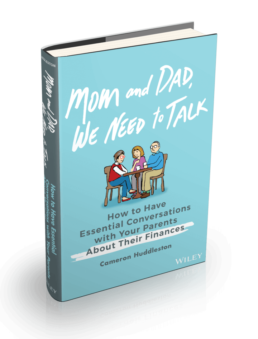Don’t ever put me in a nursing home.
I can’t tell you the number of times people have told me that their parents have said something along those lines. It doesn’t surprise me, though. After all, a survey by Nationwide Retirement Institute found that more than half of respondents said they would rather die than live in a nursing home.
The truth is, no one ever wants to get to a point in life when he or she can’t take care of himself or herself. But it happens. If it happens to your parents, you might be forced to decide whether to put them in a facility – even if they don’t want to be there.
Then you have to deal with the guilt of feeling like you failed your parents. I know I did when I decided to move my mom into a memory care facility in 2012. On top of that, some of my mom’s friends made me feel like I was a bad child – that I had given up on my mom.
Now that my mom has been in two memory care facilities for a total of eight years, I realize that I didn’t make the wrong decision. And I know that I’m not a bad child. In fact, I believe the opposite is true because I was able to recognize my limitations as a caregiver and realize that my mom would be safer with round-the-clock professional care.
What caregiving entails
You might feel like it’s your duty to take care of your parents. In fact, they might have told you they expect as much. However, you need to be aware of what caregiving entails before you agree to never put your parents in an assisted living facility or nursing home.
The physical impact
If your parents develop a chronic health condition, they likely will need assistance with all activities of daily living at some point. That means someone will have to help them get out of bed, go to the bathroom, bathe, get dressed and eat. It can be a full-time job. And it can last for years. According to AARP’s Caregiving in the U.S. 2020 study, the average duration of caregiving is 4.5 years.
What makes it harder is if your parents have dementia. They must be watched at all times to prevent them from wandering off or getting hurt. They also might be reluctant to cooperate and become belligerent. When my mom, who has Alzheimer’s disease, is forced to do something she doesn’t want to do (including showering), she can become quite angry and try to hit, push or even bite the person who is trying to help.
Providing this sort of hands-on assistance can take a physical toll on caregivers. The AARP study found that 1 in 5 caregivers report high physical strain as a result of caregiving duties. A quarter of caregivers say it’s hard to take care of their on health, and one-third say their health has suffered as a result of caregiving.
The financial impact
Of course, there’s a cost to professional care in an assisted living facility or nursing home – a high cost. However, family caregivers also pay a high cost for taking care of loved ones. According to an Associated Press-NORC Center for Public Affairs Research study, 80% pay for costs out of their own pockets. Of those with incomes of less than $50,000, 43% have had to raid their savings as a result of caregiving, and 23% said they have reduced the amount they’re saving for retirement.
The AARP study found that 1 in 4 caregivers has taken on debt, and 15% have borrowed money from friends and family. More than half have had to take time off work, while some have had to reduce work hours or quit jobs to care for loved ones.
The emotional impact
AARP’s Caregiving in the U.S. study found that 40% of caregivers said that caring for a family member was highly stressful. Those caring for a relative actually felt more stress than those caring for someone who isn’t a relative.
That stress can lead to unhealthy behaviors. The AP-NORC study found that 44% of caregivers sleep less as a result of the pressures of caregiving. Plus, 17% report drinking more alcohol to cope, and 17% report smoking more.
Honestly, I think the emotional toll of being caregiver for a parent makes it the toughest job you can ever have. The role reversal can be incredibly challenging. I didn’t like feeling that I had to be a parent to my parent for the four years I cared for my mom before moving her into a memory care facility.
The benefits of assisted living
An overwhelming majority of adults – 77% – would prefer to receive care in their own homes, according to the AP-NORC Center’s Long-Term Care Poll. It is possible to hire home health aides to care for a parent if you or your parent has the means to pay for that care. However, there are benefits your parents can receive by being in an assisted living facility or nursing home that they might not get with a home health aide.
Professional, round-the-clock care: Workers in care facilities are trained and must follow certain protocols. Agencies that provide home health aides typically provide training for their aides, too. However, when your parent is in a facility, there’s the added benefit of having several aides there at once to provide oversight. Plus, if one aide calls in sick, there will still be others in the facility to help. If a home health aide calls in sick, you can be left without a caregiver for your parent.
Social interaction: Care facilities offer an opportunity for residents to interact with each other so they don’t feel isolated. Most provide a variety of activities (and sometimes outings) for residents to keep them mentally engaged and physically active.
Safe and secure environment: Care facilities tend to have cameras throughout common spaces to monitor residents. Memory care facilities, in particular, are secure so that residents can’t wander off the property. And facilities are built to accommodate the needs of residents, with amenities such as handicap-accessible showers and toilets.
On-site medical care: Assisted living and memory care facilities tend to have nurses on staff or a nurse or doctor who makes regular visits. Skilled nursing facilities are licensed health care facilities that provide 24-hour medical care. The care is typically provided by registered nurses, certified nurse assistants, and physical, speech and occupational therapists. It’s a higher level of care than what is provided in assisted living facilities and what can be provided at home.
When assisted living makes sense
The benefits of care facilities don’t mean they are right for everyone. However, they certainly can make sense in the following situations.
Your parents’ house can’t accommodate their needs. One of the key reasons I decided to move my mom into an assisted living facility was because I didn’t think she was safe living in my house. I was afraid that she would wander off because she lived in a separate apartment in my house that had its own entrance. Of course, I couldn’t lock the door to her apartment from the outside. So she could come and go, which meant she could decide to take a walk on her own and get lost.
Plus, the apartment was on the second floor – which meant there was a risk of her falling down the stairs. And her shower wasn’t handicap-accessible, which I knew would create problems as her Alzheimer’s progressed.
Your parents need a level of care you can’t provide. There can be a whole host of reasons you can’t provide the care your parents need. You might have young children who need your care – as I did. You might have a job you can’t quit because you or your family rely on your income. You might not have the physical or emotional strength to care for your parent. Or you might not have the medical training to provide the care your parent needs.
Even if a professional caregiver is helping your parents at home, there might come a time when that caregiver can’t provide the level of care your parents need. Your parents might require a facility with a nursing staff that can provide 24-hour medical care.
As much as your parents might want to remain at home, their health and safety must be the priority. So a move to a care facility can be necessary. Certainly, some facilities are better than others. That’s why it’s so important to research all of the care options that are available for your parents and to visit several facilities to determine which is the best.
Why you don’t need to feel guilty
As I mentioned, making the decision to move my mom into a memory care facility was difficult. Ideally, parents should play a role in this decision. I talked to my mom about living someplace where she could get professional care in a safe environment. However, she would forget we had those conversations.
I hated that I had to make the decision for her and that we hadn’t talked before she developed Alzheimer’s disease about the possibility that she might need care in a facility. However, the good news is that moving her into a memory care facility was much easier and less emotional than I thought it would be. She simply said, “So I’m living here now.” I answered, “Yes,” and she settled in and started making friends.
I knew I wasn’t abandoning her. I had carefully researched facilities to find one where my mom could get better care than what I could provide. I also knew she would be safer in a secure facility than in my home.
When I made the decision to move my mom into a memory care facility after four years of caring for her, a weight was lifted off me because I felt like I could be her daughter again. With professionals caring for her around the clock, I could simply enjoy our time together rather than feel like I had to “parent” her.
Over the years, I have realized that there was no way I could have cared for my mom on my own. I still oversee her care, manage her finances, make healthcare decisions for her and visit regularly. But I’m grateful every day that she has a team of caregivers who are looking out for her.
Recognizing that I did the best I could but couldn’t do it all has helped me let go of the guilt I initially felt when I moved my mom into a care facility. You need to do the same if your parent needs a level of care that you can’t provide. You need to know that you’re not a bad kid for putting your parent in a care facility.
Don't Miss Out! ORDER NOW!
"An excellent step-by-step guide to navigate what can be time-consuming, uncomfortable conversations."
- Michelle Singletary, The Washington Post
Related Posts
September 10, 2020
What It’s Really Like When Your Parent Has Alzheimer’s Disease
My mom's decline over the past 12 years…

Cameron Huddleston
I am the author of Mom and Dad, We Need to Talk: How to Have Essential Conversations With Your Parents About Their Finances. I also am an award-winning journalist with 20 years of experience writing about personal finance. My work has appeared in Kiplinger’s Personal Finance, Forbes.com, Yahoo!, MSN, and other online and print publications.





[…] a post called “Are you a bad kid for putting your parent in assisted living?,” Huddleston says that many people feel obligated to care for their folks. They might even have […]
I needed this today, the day I am moving Mom to assisted living. I have felt like I have failed her but seven years of providing care for her has taken its role on me and my other relationships. It is hard to let go I hope she will be loved and cared for. I look forward to just being her daughter
Thank you for this article. I’m not a bad daughter
I needed to read this today. So many people have told me what a great daughter I am for the care I’ve given my widowed mother, including the employees at her assisted living facility, but somehow I can’t hold onto that assessment myself. I really want to be a daughter again and your words have reminded me that I deserve that. Thank you. I’m doing a great job.